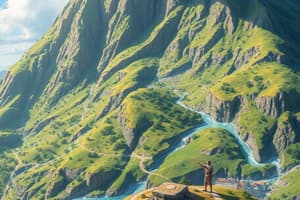Podcast
Questions and Answers
आर्थिक भूगोल किस विषय का अध्ययन करता है?
आर्थिक भूगोल किस विषय का अध्ययन करता है?
- राजनीतिक संस्थाओं का वितरण
- शहरी क्षेत्रों का विकास
- संस्कृति के तत्वों का वितरण
- आर्थिक गतिविधियों के स्थानिक पैटर्न (correct)
भूगोल में 'समस्याओं का समाधान' कौशल का क्या अर्थ है?
भूगोल में 'समस्याओं का समाधान' कौशल का क्या अर्थ है?
- भौगोलिक डेटा का विश्लेषण करना
- भूगोलिक समस्याओं की पहचान और समाधान करना (correct)
- अर्थव्यवस्था का विश्लेषण करना
- मानचित्रों के माध्यम से जानकारी साझा करना
निम्नलिखित में से कौन सा भूगोल का एक अनुप्रयोग है?
निम्नलिखित में से कौन सा भूगोल का एक अनुप्रयोग है?
- पर्यावरण प्रबंधन (correct)
- राजनीतिक चुनावों का विश्लेषण
- सांस्कृतिक पहचान का अध्ययन
- तापमान की समय श्रृंखला का अध्ययन
जनसंख्या वृद्धि का भूगोल पर क्या प्रभाव हो सकता है?
जनसंख्या वृद्धि का भूगोल पर क्या प्रभाव हो सकता है?
क्लाइमेट चेंज किस प्रकार का मुद्दा है?
क्लाइमेट चेंज किस प्रकार का मुद्दा है?
भौतिक भूगोल किस चीज़ का अध्ययन करता है?
भौतिक भूगोल किस चीज़ का अध्ययन करता है?
क्या 'स्थान' भूगोल का एक मूलभूत तत्व है?
क्या 'स्थान' भूगोल का एक मूलभूत तत्व है?
किस भूगोल की शाखा का अध्ययन जलवायु और मौसम के पैटर्न पर होता है?
किस भूगोल की शाखा का अध्ययन जलवायु और मौसम के पैटर्न पर होता है?
निम्नलिखित में से कौन सा भूगोल का उपकरण नहीं है?
निम्नलिखित में से कौन सा भूगोल का उपकरण नहीं है?
फंक्शनल क्षेत्र को किस प्रकार परिभाषित किया जाता है?
फंक्शनल क्षेत्र को किस प्रकार परिभाषित किया जाता है?
निम्नलिखित में से किसे भूमि के रूप और विकास का अध्ययन करने वाली शाखा कहा जाता है?
निम्नलिखित में से किसे भूमि के रूप और विकास का अध्ययन करने वाली शाखा कहा जाता है?
किस प्रक्रिया का अध्ययन भूगोल में 'क्षय' के रूप में किया जाता है?
किस प्रक्रिया का अध्ययन भूगोल में 'क्षय' के रूप में किया जाता है?
मानव भूगोल किस विषय का अध्ययन करता है?
मानव भूगोल किस विषय का अध्ययन करता है?
Flashcards
Physical Geography
Physical Geography
Branch of geography focusing on Earth's physical features, processes, and patterns.
Human Geography
Human Geography
Study of human populations, activities, and their relationship with the environment.
Absolute Location
Absolute Location
Precise position on Earth using latitude and longitude.
Relative Location
Relative Location
Signup and view all the flashcards
Geographic Information System (GIS)
Geographic Information System (GIS)
Signup and view all the flashcards
Formal Region
Formal Region
Signup and view all the flashcards
Movement (Geography)
Movement (Geography)
Signup and view all the flashcards
Human-Environment Interaction
Human-Environment Interaction
Signup and view all the flashcards
Economic Geography
Economic Geography
Signup and view all the flashcards
Spatial Thinking
Spatial Thinking
Signup and view all the flashcards
Urban Geography
Urban Geography
Signup and view all the flashcards
Climate Change
Climate Change
Signup and view all the flashcards
Resource Depletion
Resource Depletion
Signup and view all the flashcards
Study Notes
Physical Geography
- Physical geography is the branch of geography that studies the Earth's physical features, processes, and patterns.
- It examines the interactions between the environment and human societies.
- Scope includes landforms, climate, hydrology, biomes, and soil.
- Studies processes like erosion, weathering, and plate tectonics.
Human Geography
- Studies the spatial distribution of human populations and activities.
- Focuses on themes including population, culture, economics, politics, and urban development.
- Explores patterns and relationships between human societies and their environments.
- Investigates topics like migration, urbanization, economic development, and political systems.
Geographic Concepts
- Location: Describes the position of a place on the Earth's surface.
- Absolute location: Precise coordinates (latitude and longitude).
- Relative location: Position in relation to other places.
- Place: Unique characteristics that distinguish a location.
- Physical characteristics: Landforms, climate, vegetation.
- Human characteristics: Culture, language, traditions.
- Region: Area with shared characteristics.
- Formal regions: Defined by shared characteristics (e.g., climate or language).
- Functional regions: Defined by interaction (e.g., a metropolitan area).
- Vernacular regions: Defined by perception (e.g., "the South").
- Movement: How people, goods, and ideas move from one location to another.
- Human-environment interaction: How people adapt to and modify their environment.
Geographic Tools and Techniques
- Geographic Information Systems (GIS): System for capturing, storing, analyzing, and displaying geographic data.
- Remote sensing: Acquiring information about an object or area without physical contact through sensors.
- Maps: Visual representations of geographic data.
- Types: Topographic maps, thematic maps, etc.
- Global Positioning System (GPS): System for determining precise location on Earth using satellites.
- Fieldwork: Direct observation and data collection in the field.
Branches of Geography
- Geomorphology: Studies the origin and evolution of landforms.
- Climatology: Studies the patterns and causes of weather and climate.
- Hydrology: Studies the distribution and movement of water on Earth.
- Biogeography: Studies the distribution of plants and animals.
- Soil geography: Studies the spatial distribution of soil types.
- Population geography: Studies population distributions and patterns.
- Economic geography: Studies spatial patterns of economic activities.
- Political geography: Studies the spatial distribution of political entities and processes.
- Urban geography: Studies the spatial patterns of cities and urban areas.
- Cultural geography: Studies the spatial distribution of cultural traits.
Geographic Skills
- Spatial thinking: Ability to understand relationships and patterns in space.
- Map interpretation: Ability to analyze and interpret maps.
- Data analysis: Ability to collect, analyze, and interpret geographic data.
- Problem-solving: Ability to identify and solve geographic problems.
- Communication: Ability to effectively communicate geographic information.
Applications of Geography
- Environmental Management: Protecting and conserving natural resources.
- Urban planning: Designing and managing cities and urban areas.
- Disaster relief: Responding to and mitigating the impacts of natural disasters.
- Resource management: Managing and utilizing resources effectively.
Global Issues in Geography
- Climate change: Impact of human activities on global climate patterns.
- Natural hazards: Impacts of natural disasters on populations and environments.
- Resource depletion: Managing and conserving finite resources.
- Population growth: Impact on resources and the environment.
- Globalization: Impacts and consequences of global interactions.
Studying That Suits You
Use AI to generate personalized quizzes and flashcards to suit your learning preferences.




